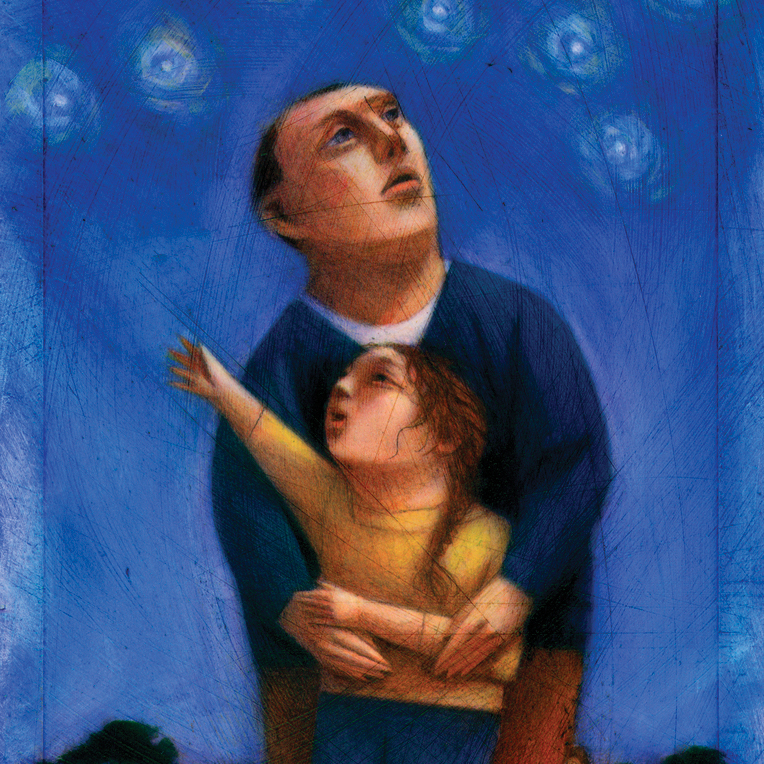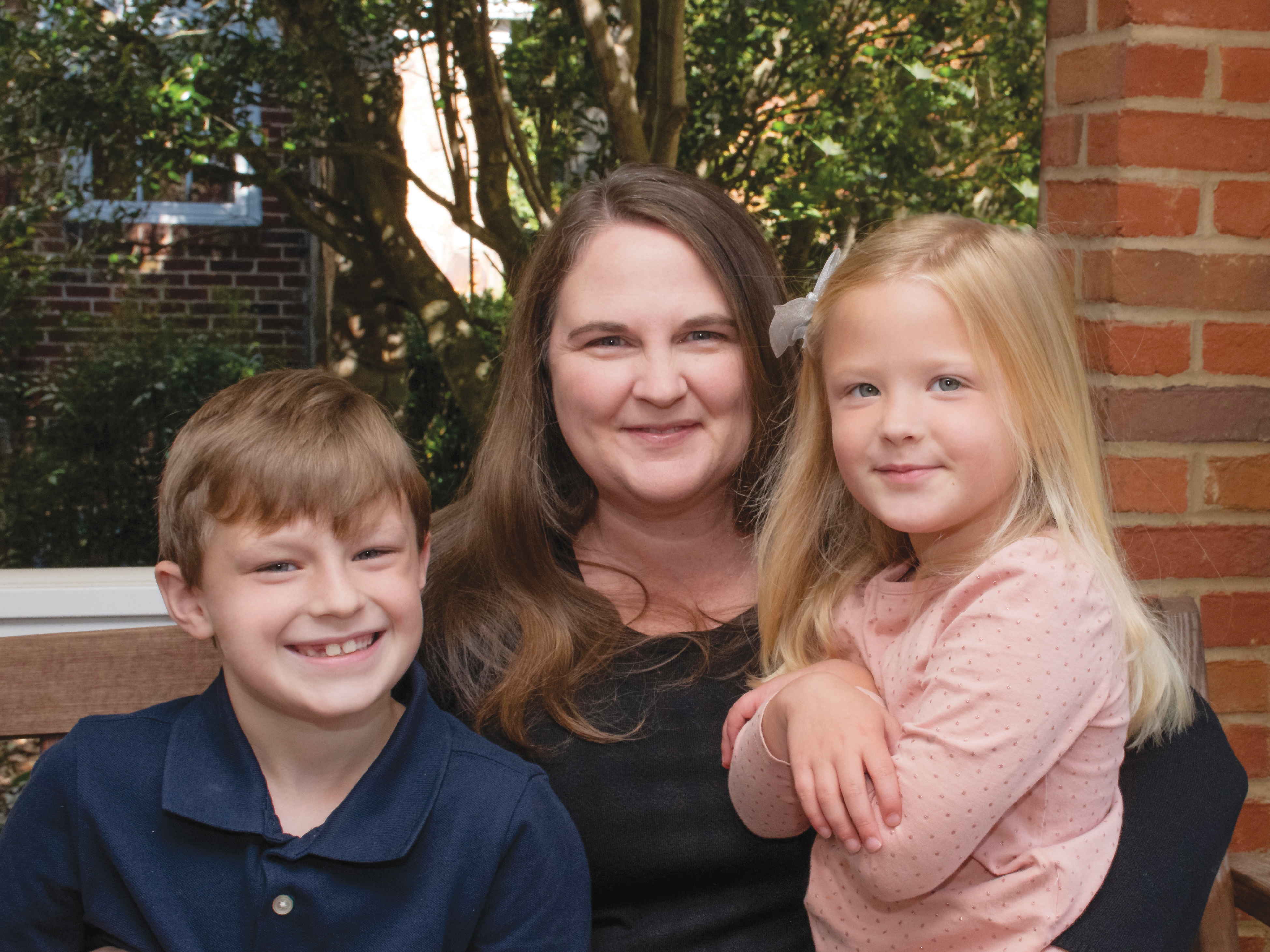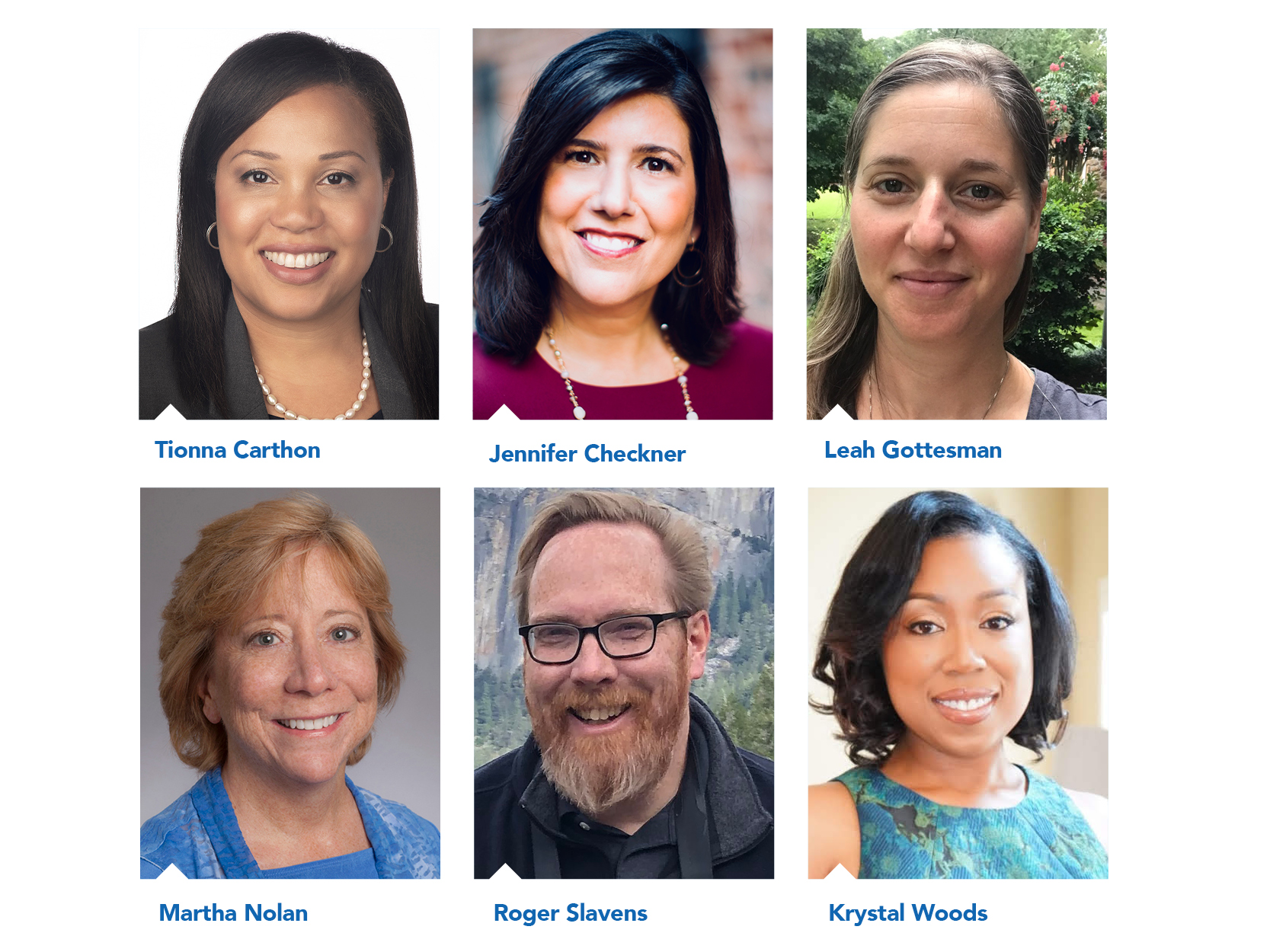Parenting During a Pandemic

The pandemic has been stressful for children and families. Some have endured great losses, including the death of a loved one. Fears of getting sick from the virus, or of a family member getting sick, have been ever present.
With many prepandemic support systems unavailable, daycares and schools closed, and isolation from friends, children of all ages suffered disruption in their lives and routines. Emory child and adolescent psychiatrist Jennifer Holton (below with her son, 8, and daughter, 5) has first-hand knowledge of the multiple roles parents have been called on to fill during the pandemic.
For parents, the pandemic has been a double stressor.
You’re making life and safety decisions for yourself and your children, as well as taking on roles you may feel unqualified for: teacher, counselor, social events coordinator, infectious disease expert.
Indeed, you might be in need of a little professional advice yourself. To that end, Emory Medicine invited child and adolescent psychiatrist Jennifer Holton, assistant professor of psychiatry and behavioral sciences at the School of Medicine, to host our virtual Dinner with a Doctor panel.
Holton took questions from six panelists about their parenting concerns (including one mom who Zoomed in from the sidelines of her child’s soccer game). As the program director for Emory’s Child and Adolescent Psychiatry (CAMP) Fellowship Program, she has expertise in the treatment of ADHD, anxiety, and mood disorders in children and adolescents. “And I’m a mom of two, so I’m also parenting during a pandemic,” Holton told panelists. “I sympathize on multiple levels.”
A JAMA Pediatrics article from August 2021 reported that the prevalence of depression and anxiety among children and adolescents around the world has doubled from prepandemic rates. “These issues existed before, but they certainly have been exacerbated,” Holton says. “I think we can all appreciate, having kids, that we’ve seen increases in other things, like sleep disruption—whether from anxiety or changes in schedules and routines—and attentional issues related to anxiety or depression or just Zoom fatigue. It’s challenging to know, is this ADHD or the pandemic fog we’re all experiencing?”
Everyone is home, and parents are under a tremendous pressure. “You’re not only trying to do your normal job, suddenly you’re supervising your children at the same time and helping to teach the older kids,” she says. “Throw in cleaning, cooking, all these things 24/7. Some have had job losses and financial stressors. We’re tired, right? As human beings, it’s a lot.”
Parent Panelist:I have little ones and they are precocious, so they ask a lot of questions. They’re always wanting to know about everything, but I worry that they’re being burdened by too much information. For example, back in March my little one caught COVID-19 and I caught it. I didn’t think it made sense to tell him at the time, he was asymptomatic. I just didn’t want him to have that stress. How much information is too much? How do we as parents strike a balance between shielding our kids from everything that is going on and wanting to be completely open and honest with them?
Dr. Holton: First, you are the experts on your own individual children; you know them better than anyone else. Sometimes you have to go with your gut on what you think they can handle and what might be too much. Pay attention to how they’re responding when you talk to them. If it feels like it’s too much, back off a bit. How much information to give, in part, depends on their developmental stage. Start with whatever they asked and try to answer that in a straightforward way, without a bunch of additional information. Just give a simple answer, one that isn’t infused with a lot of emotion, and move on. Sometimes they don’t want a huge answer. If they want more, they will ask. Other times they catch us off guard. Feel free to say, oh, that’s a good question, mommy has to think about that, let’s talk about it at dinner.
Parent: My question is on friendship formation and distancing and masking. I’m very, very pro-mask, but my kids were in school all last year, and it’s a long time to have been masked up all day. I wonder if you think that masks are changing interaction styles or their ability to connect or to read other people’s expressions?
Dr. Holton: I have wondered about that myself, especially with babies and young children learning about speech by watching our mouths and the way they move. For the most part, kids have been super resilient. Grown-ups complain about masks, but most kids will just put it on and keep it on—even kids you don’t think will, like those with ADHD. As far as kids’ abilities to connect, being back together in person is huge. It’s probably better than seeing someone’s whole-face on Zoom but not being together. And they are still getting that no-mask, whole face interaction with their families. So while there are potentially some negatives to wearing masks and returning to school in person, I think the benefits outweigh the downside. For children with disabilities and those who rely on lip reading, there are options, such as clear masks.
Parent: For those of us with teens and young adults, my teen “knows everything.” They get their news from TikTok, etc. I’ll say, where did you hear that information? And she’ll say, the internet. How do you talk to a teen who has become extremely opinionated about masking, who to be around, who not to be around? It’s all very black and white to her.
Dr. Holton: Oh, the teen years. They are in that stage where they know more than you and you can’t tell them anything. The good news is that, developmentally, she is right on target. How I might approach it, and it sounds like you’re already doing the right thing, is to talk to her. How did you come to that conclusion? If you say, “Oh no, that’s not right, it’s XY and Z,” that will not go over well. I’d use Socratic questioning and help her see there are other sources of information, other evidence, other ways people might be thinking—kind of open her eyes to other possibilities. Bucking up against you is what they are supposed to be doing as a teenager. But look for other adults they think are cool or interesting, someone you can pull in who might be able to help them look at things a different way. Sometimes they can get stuck in thinking their ideas are the only ones.
Also, you don’t want them to get into a situation where they are being hurtful to someone else. Go back to your family values. It sounds like there are things you could validate: I like how you’re being careful and trying to protect your family. I’m afraid too, and I don’t want to get sick either. At the same time, we don’t want to treat anyone badly or hurt anyone’s feelings. How can you still engage with this person in a way that feels safe? Our society has become polarized in many ways right now, and we want to model for our kids how they can still be kind, even if others have different beliefs.
Parent:Going back to being masked and social interactions, I have a teen who is introverted by nature and would still be doing school remotely if she could. We are supporting her as she makes the transition of going back to school and making new friends. She’s a sophomore, and she kind of lost her freshman year, which is a pivotal year to make connections, so high school is still pretty new to her. How can I help her to break through the masks when she has the tendency to hunker down, get on the computer, and have her own little insular world?
Dr. Holton: I’ve worked with so many people who, when the pandemic hit, I thought, oh this is going to be tough for them. And for some, it was incredibly hard. But there were others who thrived. That’s not an uncommon situation, where people who have more social anxiety feel more comfortable at home. So after a year of being at home, for some of us it’s difficult to go out there and get back to it. In an ideal world, there would be a more gradual transition for people who are struggling. If there are ways to get her involved in smaller groups, that can sometimes be helpful, rather than, “Here I am in my whole big school with all these people I don’t really know because I’ve only seen them on the computer.” Also, just acknowledge for her that, yes, this is hard for a lot of us. Especially if you have similar issues. Sometimes it’s just knowing they are not alone in what they are experiencing.
Parent: We made the decision to keep our child at home for a year, although he’s preschool age. Do you have any advice about the importance of socialization for a preschooler, what impact that has on them? He’s an only child and mostly around adults. His only engagement with kids his age is via YouTube. We do take him to parks and such, but outside of that, I feel like he’s missing out by not being in school.
Dr. Holton: Preschool or not, for most young children at home during the pandemic, there have been less interactions available for them with other kids. And you are correct, socialization is an important part of development. It’s the way young children learn to play with others and share. But he’s young, he’s going to get that, I wouldn’t be worried about it. When you are ready and comfortable with having him around other kids more, think about families you feel comfortable with whose children are similar ages and who have similar COVID practices to your own family. Be mindful about creating ways for him to play and engage with others—your child and another child. It can be with masks or outside. It can be a gradual reintroduction.
Parent: My daughter has some social anxiety. Toward the end of last year, she said, “Mom, I hate to say this, but 2020 has been one of my very best years ever.” She enjoyed the opportunity to lay low.
Dr. Holton:Her experience is like many others’ experiences. On the flip side, at some point, the world will return to normalcy. So for those who enjoyed the break from all these social expectations, as we shift, we must be mindful that they might struggle a bit more. I’m delighted she’s had a wonderful year. Some young people did really well during the pandemic, and thank goodness for that.
Parent:We’ve talked about our kids living through it. But what about us as parents? Working parents have so many things pulling at us all the time. My biggest fail of last year was not being able to help my kids; they basically parented themselves. During the day they were either doing virtual school or laid in their beds. Now that we’re back at it and I’m taking them to school and coordinating activities, I feel like I’m constantly drowning. How do you suggest that working parents cope with that?
Dr. Holton: We probably need to be kinder to ourselves. We expect we can do all these things and forget we’ve been through the wringer. Do as much as you can to lower your expectations—for yourself as a parent and for them. Sounds to me like you did just fine and they did just fine. They learned how to do things for themselves, gained some independence. Now that we’re getting back in the swing of things, we may need to say, “OK, why do you need this number of activities, why am I hauling you to everything?” It’s OK to cut back if things feel overwhelming. Also is there any way you can get help? This has been a huge shift and transition. It was not gradual; it went from zero to 60 instantaneously. Get creative, find ways to lighten the load, such as carpooling. And find a few moments of quiet, or a bit of time to be with each individual child. Tell them, “It’s just you and me, let’s do something you want to do.” It’s a chance to do something fun or meaningful they will remember from this time.
Top Three Tips from Dr. Holton: | ||
ONE It’s important not only to take care of yourself but also to model self-care for kids. Just basic things, like getting enough sleep, eating healthy foods, finding enjoyable or relaxing activities to engage in. | TWO Watch your children and be attuned to changes in mood, concentration levels, sleep, appetite, energy, participation in activities. Take notice if they have preoccupations, persistent fears and worries that are having a negative impact on their day-to-day life or a change in their engagement with others. If you sense a serious issue, reach out to someone for help: a school counselor, mental health professional, or another mental health resource. | THREE Validate the resourcefulness of older kids. Teens, even early in the pandemic, were finding creative ways of meeting up, hanging out in parks or pulling their cars up next to each other so they could eat their food and talk while socially distancing. They have a lot to bring to the table. |



